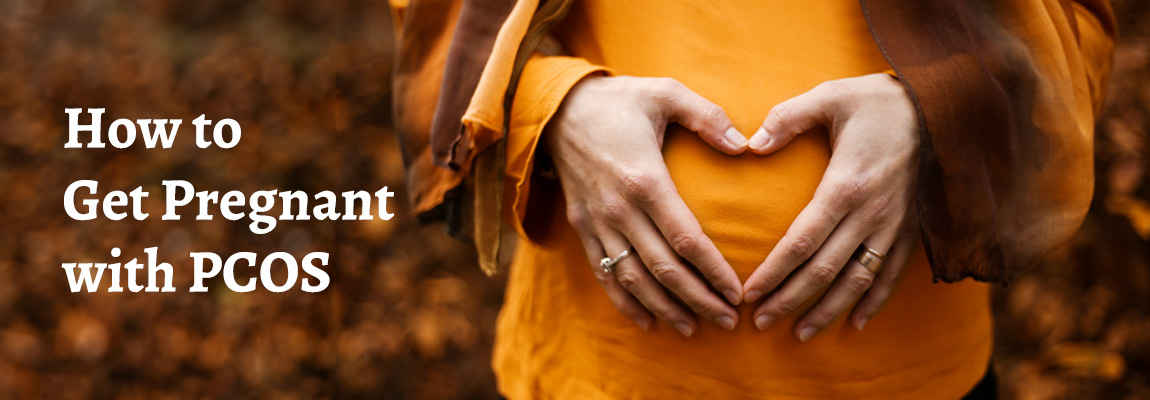
PCOS, or Polycystic Ovary Syndrome, is a hormonal condition that affects fertility, which can make it difficult to get pregnant. According to the CDC (Centers for Disease Control and Prevention), up to 12% of people in their childbearing years have PCOS.
As the condition can make it more difficult to conceive, there are several treatments and ways that can help you boost your fertility and improve your chances of getting pregnant.
How Does PCOS Affect Fertility?
PCOS, or Polycystic Ovary Syndrome, affects many women and can lead to various challenges in their reproductive health. PCOS disrupts the typical menstrual cycle, where an egg is released monthly for potential fertilization. The hormonal imbalance in PCOS, particularly elevated levels of male hormones (androgens) and insulin interferes with this process. As a result, ovulation may be irregular or absent, and eggs may not mature properly, posing difficulties in conception for those affected by this condition.
5 Ways to Increase the Chances of Pregnancy with PCOS
1. Weight Management
While being overweight is directly linked with PCOS, it is not necessary that all women suffering from this condition are overweight. According to some studies, shedding 5% of one’s weight can enhance the fertility rate and reduce other PCOS symptoms. Incorporating regular exercises such as taking walks and increasing your daily steps day by day can be very beneficial. Also, opting for a standing desk instead of sitting for prolonged periods and incorporating light weightlifting and cardio during leisure activities like watching TV can help build muscles, thereby reducing PCOS symptoms and promoting overall health. These simple lifestyle changes can contribute to better management of PCOS symptoms and overall well-being.
2. Eat Nutritious Foods
For any woman aiming to conceive, ensuring proper nutrient intake is crucial. Opt for nutritious alternatives by swapping sugary foods, simple carbs, and unhealthy fats with healthier options such as fresh and cooked fruits and vegetables, whole grains like quinoa, farro, barley, brown rice and oats, beans, lentils, chicken, and fish. Additionally, certain vitamins and minerals play a vital role in promoting a healthy pregnancy and supporting fetal growth. Consult your doctor to determine the most suitable supplements for your needs. Supplements that may enhance fertility include folic acid (vitamin B9), vitamin B6, vitamin B12, vitamin C, vitamin D, vitamin E, and coenzyme Q10.
3. Lifestyle Changes
Embracing a healthy lifestyle not only boosts fertility but also enhances overall well-being. This approach significantly lowers pregnancy risks linked to PCOS, like miscarriage and diabetes, while reducing long-term risks of type 2 diabetes, high blood pressure, and heart disease.
Prioritize a balanced diet filled with whole grains, fruits, vegetables, lean proteins, and healthy fats. Engage in regular exercise, like brisk walking or swimming, for about 30 minutes, three to five times weekly, to manage weight, curb insulin resistance, and balance hormone levels.
Additionally, you can also manage stress through practices such as yoga or meditation, which can further support fertility. With these lifestyle changes, you’re not just enhancing your chances of conception but also promoting lasting health benefits.
4. Medications
For some people with PCOS, taking medicines can help manage the condition or improve the chances of getting pregnant. Your regular doctor or an obstetrician/gynecologist might prescribe these meds, or you may see an endocrinologist or PCOS specialist.
- Metformin
If your insulin levels are high, your doctor might suggest testing and prescribe metformin, a medicine for diabetes. It can help with insulin resistance and sometimes weight loss, and it might improve your chances of getting pregnant.
- Clomid
Clomid is a common fertility drug often used for PCOS. Many people with PCOS find success with it, although it doesn’t work for everyone. Sometimes, combining metformin with Clomid can help if Clomid alone doesn’t work.
- Letrozole
When metformin and Clomid don’t do the trick, doctors might consider letrozole. Even though it’s a cancer drug, studies show it can be effective for ovulation in people with PCOS, and it’s generally safe.
- Gonadotropins
If other drugs don’t work, injectable fertility drugs like gonadotropins might be the next step. These drugs stimulate egg production. There’s a higher risk of a condition called ovarian hyperstimulation syndrome (OHSS) with these drugs, especially for people with PCOS. Your doctor will likely monitor you closely to avoid any issues.
5. Fertility Treatments
If PCOS medications don’t lead to pregnancy, advanced infertility treatments are available. These include hormone injections, a minimally invasive procedure called ovarian drilling to stimulate ovulation, and in vitro fertilization (IVF). Though dealing with PCOS while trying to conceive can be daunting, there’s hope. Consult with a healthcare provider to discover the lifestyle changes and medications that suit you best.
Conclusion
Getting pregnant with PCOS can be emotionally challenging; it is essential to seek support from your family, partner, and friends to help you cope with the stress and emotional challenges. You can get help from support groups, counseling, or therapy to address any depression or signs of anxiety that may arise during the process of the journey. This will help to gain useful insights from people who have had the same experiences.
In addition, while PCOS has fertility difficulties, know that there are multiple ways to improve your chances of getting pregnant. If you are experiencing PCOS symptoms, it is important to seek emergency medical attention with your PCOS specialist. Prompt diagnosis, coupled with good lifestyle changes, weight management, and appropriate medications, can enhance your chances of getting pregnant.
With the right approach and strategies, several people suffering from PCOS conceive and fulfill their desire to start a family.